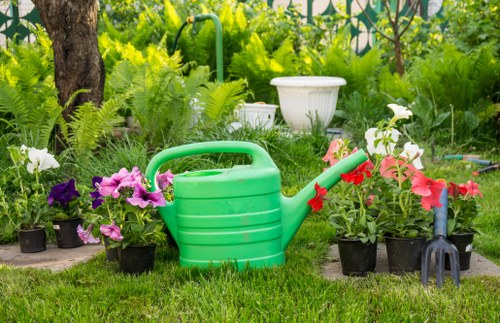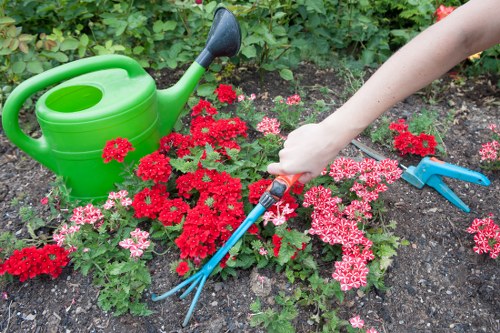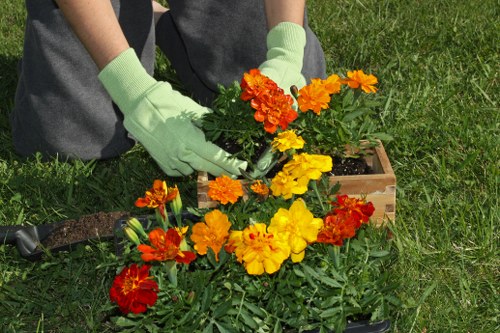Comprehensive Guide to Garden Maintenance in Norwood
Introduction to Garden Maintenance

Maintaining a beautiful garden in Norwood requires dedication, knowledge, and the right set of tools. Whether you're a seasoned gardener or a beginner, understanding the specific needs of your garden can make all the difference in creating a vibrant and healthy outdoor space.
In Norwood, the climate and soil conditions play a significant role in determining the types of plants that will thrive. By implementing proper garden maintenance practices, you can ensure that your garden remains lush and flourishing throughout the year.
Garden maintenance involves a variety of tasks, including pruning, weeding, fertilizing, and pest control. Each of these tasks contributes to the overall health and appearance of your garden, making it a pleasant place for relaxation and enjoyment.
Seasonal Garden Maintenance Tips

Spring Maintenance
Spring is a crucial time for garden maintenance in Norwood. As the weather warms up, it's essential to prepare your garden for the upcoming growing season.
Start by clearing out any debris that accumulated over the winter months. This includes removing dead leaves, branches, and any other fallen materials that could harbor pests or diseases.
Once the garden is clean, it's time to focus on soil preparation. Aerate the soil to improve drainage and increase oxygen levels, which promotes healthy root growth.
Summer Maintenance

During the summer months, garden maintenance in Norwood shifts towards managing heat and ensuring adequate hydration for your plants.
Regular watering is essential, especially during dry spells. Consider installing a drip irrigation system to provide consistent moisture without overwatering.
Mulching around plants helps retain soil moisture, suppress weeds, and regulate soil temperature, making it an effective summer maintenance practice.
Essential Gardening Tools

Basic Tools Every Gardener Needs
Having the right tools is fundamental to effective garden maintenance. Invest in high-quality gardening tools to make your tasks easier and more efficient.
Some essential tools include:
- Pruning Shears: For trimming and shaping plants.
- Garden Fork: Useful for aerating soil and turning compost.
- Hand Trowel: Ideal for planting and weeding small areas.
These tools not only enhance your gardening experience but also contribute to the overall health of your garden by allowing precise and effective maintenance.
Advanced Gardening Equipment

For those who take garden maintenance to the next level, investing in advanced equipment can significantly improve efficiency and results.
Consider tools such as:
- Lawn Mowers: Essential for maintaining a neat and even lawn.
- Hedge Trimmers: Perfect for shaping hedges and shrubs.
- Wheelbarrows: Facilitate the transportation of soil, plants, and other materials around the garden.
Using advanced equipment can save time and effort, allowing you to focus on more detailed aspects of garden maintenance.
Pest and Disease Management

Identifying Common Pests in Norwood
Pests can pose a significant threat to your garden's health. In Norwood, common pests include aphids, snails, and caterpillars, which can damage plants and reduce productivity.
Regularly inspect your plants for signs of infestation, such as chewed leaves, discolored foliage, or the presence of the pests themselves.
Implementing natural pest control methods, such as introducing beneficial insects like ladybugs, can help manage pest populations without harming your garden.
Soil Health and Fertilization

Testing and Improving Soil Quality
Healthy soil is the foundation of a thriving garden. Conducting regular soil tests helps determine nutrient levels and pH balance, guiding your fertilization strategy.
In Norwood, the soil may require amendments such as compost or organic matter to enhance fertility and structure.
Applying the right type of fertilizer based on your soil test results ensures that plants receive the necessary nutrients for optimal growth.
Organic vs. Synthetic Fertilizers

Choosing between organic and synthetic fertilizers depends on your garden's needs and your personal preferences.
Organic Fertilizers: Derived from natural sources, they improve soil structure and promote microbial activity, leading to long-term soil health.
Synthetic Fertilizers: Provide immediate nutrients but may require careful application to avoid over-fertilization and potential harm to beneficial soil organisms.
Balancing both types can offer the benefits of immediate nutrient availability and sustained soil health.
Pruning and Trimming Techniques

Why Pruning is Essential
Pruning is a critical aspect of garden maintenance, contributing to plant health, aesthetics, and productivity.
Proper pruning encourages the growth of strong branches, improves air circulation, and reduces the risk of disease by removing dead or damaged parts.
Different plants require specific pruning techniques, so understanding the needs of each plant species in your garden is essential.
Pruning Tools and Best Practices

Using the right tools ensures clean cuts and minimizes damage to plants. Essential pruning tools include:
- Pruning Shears: Ideal for small branches and precise cuts.
- Pruning Saws: Suitable for thicker branches that require more force.
- Secateurs: Perfect for detailed pruning tasks.
Always sterilize your tools before and after use to prevent the spread of diseases between plants.
Adopt correct pruning techniques, such as cutting at a 45-degree angle just above a bud or branch, to promote healthy growth.
Weed Control Strategies

Preventing Weed Growth
Weeds compete with your plants for nutrients, water, and sunlight, making their control a vital part of garden maintenance in Norwood.
Implementing preventive measures, such as mulching and manual weeding, can significantly reduce weed proliferation.
Regularly inspecting your garden for weed seeds and removing them before they take root helps maintain a weed-free environment.
Watering Techniques

Optimizing Water Usage
Efficient watering is crucial for plant health and water conservation. In Norwood, it's important to tailor your watering schedule to the specific needs of your garden.
Early morning watering reduces evaporation and ensures that plants receive adequate moisture throughout the day.
Using drip irrigation systems can target water directly to the plant roots, minimizing waste and promoting deep root growth.
Rainwater Harvesting

Harvesting rainwater is an eco-friendly way to meet your garden's watering needs. Setting up rain barrels collects runoff, providing a sustainable water source during dry periods.
Rainwater is free from chemicals found in tap water, such as chlorine, making it beneficial for plant health.
Incorporating rainwater harvesting into your garden maintenance plan can reduce water bills and promote environmental sustainability.
Choosing the Right Plants

Plant Selection for Norwood Climate
Selecting plants that are well-suited to Norwood's climate ensures easier maintenance and healthier growth.
Consider factors such as temperature ranges, rainfall patterns, and soil types when choosing plants for your garden.
Native plants often require less maintenance and are more resilient to local pests and diseases, making them an excellent choice for Norwood gardens.
Annuals vs. Perennials

Understanding the difference between annuals and perennials helps in planning your garden layout and maintenance schedule.
Annuals: Complete their life cycle in one growing season, providing vibrant blooms but requiring replanting each year.
Perennials: Live for multiple years, offering long-term beauty and reducing the need for frequent planting.
Incorporating a mix of both can create a dynamic and continually evolving garden space.
Lawn Care in Norwood

Mowing Techniques
A well-maintained lawn enhances the overall appearance of your garden. Proper mowing techniques are essential for a healthy turf.
Set your mower to an appropriate height for the type of grass you have, typically around 2.5 to 3.5 inches.
Mow regularly during the growing season, ensuring you never remove more than one-third of the grass blade at a time to prevent stress.
Garden Lighting Solutions

Enhancing Garden Aesthetics
Incorporating lighting into your garden maintenance plan adds beauty and functionality, allowing you to enjoy your garden even after sunset.
Use a combination of ambient, task, and accent lighting to highlight specific garden features and create a welcoming atmosphere.
Solar-powered lights are an eco-friendly option, reducing energy consumption while providing effective illumination.
Choosing the Right Fixtures

Selecting appropriate lighting fixtures depends on the areas you wish to illuminate and the desired effect.
Path Lights: Ideal for illuminating walkways and garden paths.
Spotlights: Perfect for highlighting trees, sculptures, or architectural features.
String Lights: Create a festive and charming ambiance for outdoor gatherings.
Composting and Waste Management

Benefits of Composting
Composting is a sustainable garden maintenance practice that transforms organic waste into valuable fertilizer for your plants.
By composting kitchen scraps, yard waste, and other biodegradable materials, you reduce landfill waste and enrich your garden soil.
Healthy compost improves soil structure, retains moisture, and provides essential nutrients, fostering robust plant growth.
Setting Up a Compost Bin

Creating a compost bin is straightforward and can be done using various materials such as wood, plastic, or wire mesh.
Ensure your compost pile has a balanced mix of green (nitrogen-rich) and brown (carbon-rich) materials to promote effective decomposition.
Regularly turning the compost helps aerate the pile, speeding up the decomposition process and preventing unpleasant odors.
Mulching Practices

Types of Mulch
Mulching is an essential garden maintenance technique that offers multiple benefits, including moisture retention, weed suppression, and temperature regulation.
There are various types of mulch available, each with its unique advantages:
- Organic Mulch: Includes materials like bark, straw, and compost, which enrich the soil as they decompose.
- Inorganic Mulch: Such as gravel, rock, or plastic, durable and effective for long-term weed control.
- Living Mulch: Ground cover plants that provide natural weed suppression and add greenery to your garden.
Choosing the right type of mulch depends on your garden's needs and the specific areas you intend to cover.
Garden Design and Layout

Planning Your Garden
A well-designed garden layout enhances both aesthetics and functionality. Careful planning ensures that plants are placed in optimal positions for growth and visual appeal.
Consider factors such as sunlight exposure, soil quality, and plant compatibility when designing your garden layout in Norwood.
Incorporate elements like pathways, seating areas, and focal points to create a cohesive and inviting outdoor space.
Choosing Complementary Plants

Selecting plants that complement each other in terms of color, texture, and height contributes to a harmonious garden design.
Create layers by combining ground covers, mid-level plants, and taller specimens to add depth and dimension to your garden.
Incorporate a mix of flowering plants, evergreen shrubs, and ornamental grasses for year-round interest and variety.
Eco-Friendly Garden Practices

Promoting Sustainability
Adopting eco-friendly garden maintenance practices not only benefits the environment but also enhances the health and resilience of your garden.
Implementing water conservation techniques, such as rainwater harvesting and drip irrigation, reduces water usage and supports sustainable gardening.
Choosing native and drought-tolerant plants minimizes the need for excessive watering and maintenance.
Reducing Chemical Usage

Limiting the use of chemical fertilizers and pesticides promotes a healthier garden ecosystem and protects beneficial insects and wildlife.
Opt for organic alternatives and integrated pest management strategies to control pests and diseases naturally.
Encourage biodiversity by planting a variety of species, which helps create a balanced and self-sustaining garden environment.
Professional Garden Maintenance Services

When to Hire Experts
While DIY garden maintenance is rewarding, there are instances when professional services can enhance your garden's health and appearance.
Hiring experts ensures that your garden receives specialized care, especially for complex tasks like landscape design, pest control, and soil remediation.
Professionals have the knowledge and resources to address specific garden challenges, providing tailored solutions that align with your gardening goals.
Benefits of Regular Garden Maintenance

Healthier Plants and Higher Yields
Consistent garden maintenance leads to healthier plants, which are more resistant to diseases and pests. Regular care ensures that plants receive the necessary nutrients and conditions for optimal growth.
For vegetable gardens, proper maintenance translates to higher yields and better-quality produce, making your gardening efforts more rewarding.
A well-maintained garden also enhances curb appeal, increasing the value of your property and providing a pleasant environment for outdoor activities.
Environmental Impact

Engaging in sustainable garden maintenance practices contributes positively to the environment. Practices like composting, mulching, and water conservation reduce waste and promote resource efficiency.
By fostering biodiversity and creating habitats for beneficial insects and wildlife, your garden becomes a part of the larger ecosystem, supporting environmental balance.
Eco-friendly gardening also reduces reliance on chemical inputs, leading to cleaner air and soil, and promoting overall environmental health.
Conclusion

Effective garden maintenance in Norwood involves a combination of proper planning, regular care, and sustainable practices. By understanding the specific needs of your garden and implementing the tips outlined above, you can create a thriving and beautiful outdoor space.
Whether you choose to maintain your garden yourself or seek professional services, the key to success lies in consistency and attention to detail.
Don't wait to transform your garden into a vibrant oasis. Contact us today or Book your service now to ensure your garden receives the care it deserves.